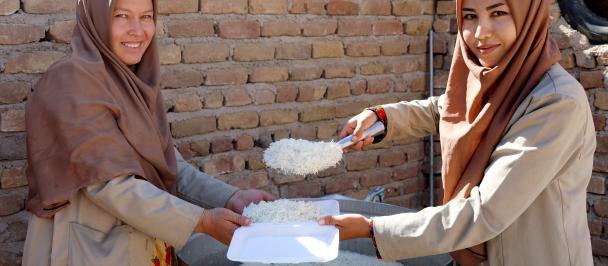Ghuncha Gul is a woman farmer fondly known as ‘honey’ by her villagers as she keeps bees to make honey. She also manages a greenhouse.
In her village, people always assumed women couldn’t work. But she proved that women are strong and can work, not only to her fellow villagers but to many others.
“Women in villages work just as hard as men. In fact, we work alongside the men," she says.
“If I am a woman and a mother, it doesn’t mean I am made for staying at home. If a woman can manage a house, raise a child and secure its future, it means we can do anything," said Guncha Gul.
One of her dream was to have her own greenhouse and beehives. She achieved this thanks to UNDP’s Climate Change Adaptation Project.
At first, the women were afraid and did not believe that they could manage the greenhouse. But now they harvest cucumbers, organize and sort all the seedlings, and perform other tasks.
Seven months have passed since they established the greenhouse and she seen increase in her income together with eight other women who work alongside her. She earns more or less 30 US$ per day. From what they sell at the market, the women put aside money to maintain the greenhouse. The rest is shared between them.
At first, they cultivated root vegetables. Now they grow cucumber and tomatoes, depending on the season.
“We are no longer the same women as we were last year. We have changed in 1 year, or even made 10 years’ worth of improvement!” says Ghuncha Gul. “If there was no greenhouse we would not have achieved this change.”
In their village in Injil district, Ghuncha Gul and her fellow women are bringing change to their village and contributing to economic development in Afghanistan.
“It may be just a small greenhouse, but our ingenuity and dreams have no limit," she adds.
To diversify livelihoods and improve women’s economic freedom, UNDP has implemented several other projects in Herat districts. These include: 6 raisin houses, 10 greenhouses, 1 apiary, and kitchen gardens for 30 women.
UNDP’s Climate Change Adaptation Project (CCAP), is a five-year project, made possible by the Global Environment Facility Least Developed Countries Fund. Over the next three years, together with the Ministry of Agriculture, UNDP will implement more than 100 livelihoods projects, including building more greenhouses and training farmers on food processing and food storage, as well as protecting 800 hectares of land from flooding, irrigate 4,000 hectares of agricultural land and repairing 30 canals.
Other UNDP environment projects are helping people adapt and find jobs in the face of climate change, bringing clean power to rural areas, preparing for natural disasters, establishing and protecting national parks, and conserving biodiversity for future generations.

 Locations
Locations




